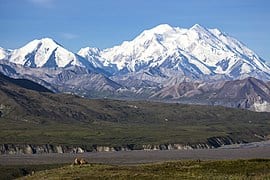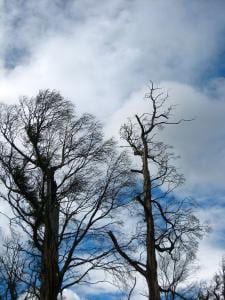 I recently returned from a plane and cruise trip to and from Alaska. The entire trip began in Anchorage, whence we traveled on land for four days, and then boarded a cruise ship—Celebrity Line—for a seven day float on the inside passage from Juneau to Skagway to Icy Straight Point to Ketchikan, ending in Vancouver BC. On the trip, my wife, Diana, and I led a five-session lecture series on wilderness and its connections to the Bible. In addition, and hardly incidentally, Diana and I celebrated our 50th wedding anniversary the day we stepped on the ship, August 23. As an added bonus, many of those who traveled with us were long-time friends from Dallas. And to top it all off, one of the bridesmaids from our wedding, and Diana’s college roommate, and her husband, joined us, too. The tour leader threw us a surprise celebration that very night. All in all, it was a fabulously memorable occasion!
I recently returned from a plane and cruise trip to and from Alaska. The entire trip began in Anchorage, whence we traveled on land for four days, and then boarded a cruise ship—Celebrity Line—for a seven day float on the inside passage from Juneau to Skagway to Icy Straight Point to Ketchikan, ending in Vancouver BC. On the trip, my wife, Diana, and I led a five-session lecture series on wilderness and its connections to the Bible. In addition, and hardly incidentally, Diana and I celebrated our 50th wedding anniversary the day we stepped on the ship, August 23. As an added bonus, many of those who traveled with us were long-time friends from Dallas. And to top it all off, one of the bridesmaids from our wedding, and Diana’s college roommate, and her husband, joined us, too. The tour leader threw us a surprise celebration that very night. All in all, it was a fabulously memorable occasion!
However, upon our return to Los Angeles, I have had more sobering thoughts about our experience, and have now noted just how deeply ironic our trip and its subject were. We were speaking about the environment, and its most notable danger, climate change. July, 2019 was the hottest month ever recorded on our planet since such records have been kept for nearly 150 years. That month beat the old record established in July of 2016. Of the past ten years of heat records, eight have been the hottest on record. The CO2 concentration in the atmosphere has gone past 425 parts per million, shattering what many had determined may have been the tipping point of 350 parts per million. Going well past that lower figure nearly insures that many of the dire consequences of a warming planet cannot now be entirely avoided. In short, we all now face possible climate catastrophe.
We spoke of these dire possibilities while ensconced on a luxury cruise ship. Here are some facts about such ships. Each one of the behemoths—our ship carried some 2,000 passengers—uses about 150 tons of heavy diesel fuel each day, spewing out carbon particles that equal that of approximately 1,000,000 automobiles. Many cruise lines have been fined for this continued atmospheric abuse—Carnival Lines was recently fined $40,000,000 for its continuous refusal to install filtering devices to mitigate at least partially this problem—but Carnival is hardly the only culprit. Currently, no cruise line in the world has installed such filters, despite constant demands to do so. Also, all the world’s cruise ships dump over one billion—billion with a “b”—gallons of sewage into our oceans each year. This includes human waste and tons of plastic, a devastating assailant of fish and ocean mammals. While Diana and I were urging our listeners to take the dangers of climate change with great seriousness, the ship we were so blithely occupying was continuing its dangerous surge through the seas.
This, of course, says nothing of the air flights we took to get to the ship. Diana and I flew from LA to Seattle, where we spent four lovely nights on Bainbridge Island, and then on to Anchorage. And from Vancouver BC we flew first to Portland and then on to LA, thus adding significant CO2 from jet fuel to the overburdened air above us. I think now of the several cruises we have taken at the behest of a company that has offered to us travel in exchange for our expertise in certain religious subjects. As you can readily see, my current quotient of guilt is at this moment quite high!
I fear I also need to add what we found in Alaska during the ground portion of our trip. We landed in Anchorage in the late afternoon. During my previous trips to Anchorage—I have made five or six—I was often able to see Mount Denali, the highest peak in North American, from my airplane’s window. The mountain is about 300 miles away! This time we could barely see to the end of the runway, because Anchorage was enshrouded with a brown cloud of dense smoke, the result of a huge fire on the Kenai Peninsula, south of the city. That fire was among over 200 blazes bedeviling the state, in nearly every part of Alaska. The previous week Anchorage had recorded its hottest ever temperature—95 degrees! For a place that rarely surpasses 70, this was scary news indeed. In fact, in the preceding month of July, Anchorage had not fallen below 70 degrees for its first month ever. We have long been told that climate change would be more pronounced the closer one lives near the two poles. Hence, Alaska and Australia appear to be suffering similar fates, rising temperatures, increasing droughts, and dangerous fires.
The mountain is about 300 miles away! This time we could barely see to the end of the runway, because Anchorage was enshrouded with a brown cloud of dense smoke, the result of a huge fire on the Kenai Peninsula, south of the city. That fire was among over 200 blazes bedeviling the state, in nearly every part of Alaska. The previous week Anchorage had recorded its hottest ever temperature—95 degrees! For a place that rarely surpasses 70, this was scary news indeed. In fact, in the preceding month of July, Anchorage had not fallen below 70 degrees for its first month ever. We have long been told that climate change would be more pronounced the closer one lives near the two poles. Hence, Alaska and Australia appear to be suffering similar fates, rising temperatures, increasing droughts, and dangerous fires.
The choking brown cloud followed us north out of Anchorage on our way to Denali National Park. We finally escaped the sludge about 100 miles out of the city. Our tour guide suggested that we douse some paper towels with water and cover our mouths and noses as we drove through the mess. Diana, I fear, ingested too much of the stuff and began a sickness of the respiratory tract that is only now, four days after our return home, beginning to abate. She was very ill on the ship, and surely part of that illness must be attributed to the horrible Alaskan air. For two days we were out of the pollution, but as we moved back south toward Seward and the ship, we reentered the cloud and spent several hours breathing the muck again. Only after some hours out into the Sea of Alaska, were we able to escape and breathe clean air again.
I do not wish to be simplistic concerning our trip. It is always dangerous to connect directly any weather events with the reality of climate change; we ought be careful not to say that climate change is the “sole cause” of this or that event. However, the vast Alaskan fires, along with the dangerous category 4-5 hurricane Dorian now ravaging the Bahamas and threatening the coastal US are surely partly at least the product of a warming planet, producing a much warmer Caribbean and Gulf of Mexico along with a much warmer arctic. Our planet is changing and not for the better, especially for many who are the least prepared to endure the changes.
And now back to guilty me. Speaking of environmental danger while on a cruise ship and flying in planes to that ship, could be seen as the very epitome of hypocrisy. What right have I, as a first-world privileged human being, to urge others to address their roles in climate change, while I am contributing to that very problem so obviously and egregiously? It is a fair and immensely difficult question. Yesterday in my LA church, I preached about climate change and after the service offered further insight into the problems in a class of some 50 parishioners. Everywhere I am now asked to speak—and since my retirement from my professorial post now 7 years ago, those opportunities are far fewer—I will speak of this issue, and how the Bible can offer to us rich resources for acting on this set of problems before they become completely unmanageable. It is what I can do as a student and lover of the Bible. Still, that cruise ship and those planes haunt my dreams, as well they should. I can only say that I hope to be a better servant of the planet in future, and that cruise ships will not be a part of that future for me.











